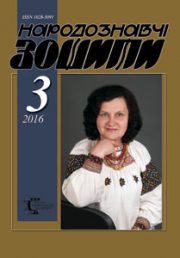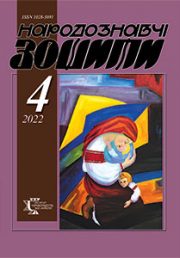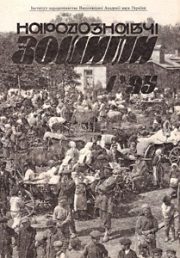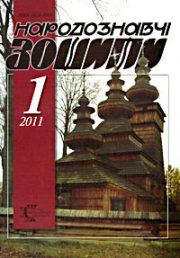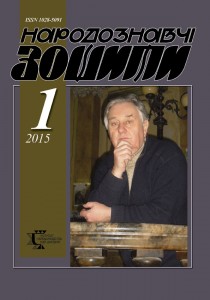
Roman Yatsiv. Twenty years of intellectual discourse. P. 3
read »
Pavluk Stepan. Onique studies in Ukrainian sacral architecture. P. 5
In the article have been described main processes in formation, creative progress and scientific result by known architect, ethnologist, Laureate of National architectural prize, Correspon¬ding Member of Ukrainian Academy of Architecture, History Doctor, Professor, Managing Head of Modern Ethnology Dept. in the Ethnology Institute of NASU, Mr. Yaroslav Taras who has Roman
Keywords: Yaroslav Taras, architecture, ethnology, Chornobyl, Ukrainian church, people’s construction.
read »
Balahutrak Mykola. On two shoulders of Yaroslav Taras’ scientific activities. P. 9
The light has been thrown upon multilateral scientific activities of Prof. Yaroslav Taras, scholar and architect known in the world as well as in Ukraine, History Doctor, whose research-works have been determined by contemporary processes of globalizing and transforming.
Keywords: Yaroslav Taras, architecture, ethnology, Chornobyl, Ukrainians of Moldova, Ukrainian church, people’s construction.
read »
Taras Yaroslav. Ukraine’s sacral wooden architecture of X to XXI cc. P. 16
The article has brought a research consideration of some historical conditions that determined featuring of constructive practice as to wooden churches from the epoch of Early Christianity to the present-day Ukraine as well as among Ukrainian migrants in USA, Canada and Western Europe; definitions have been made of artistic measures used in materialization of ideological phenomena and national identity markers in church constructions, ethnical signs ignored by colonizers of Ukrainian territories; directions for revival of sacral wooden architecture in independent Ukraine have been traced.
Keywords: sacral architecture, wooden church, construction, national identity, ethnical marker, artistic image, revival.
read »
Vovkanych Stepan. On Ukrainian national idea as a component of strategic approach to formation of ideological bases in state-building policy. P. 45
On the basis of analytic studies as for the threats to the processes of state building in Ukraine and preservation of its national identity it has been suggested the introduction and usage of national components of the Ukrainian idea to the level of socio-economic stratagem of power, systems of its national safety and collective euroatlantic defence.
Keyword: Ukrainian national idea, ideological base, strategem of development, national identity, Ukrainian wordview, information war.
read »
Tarasiuk Iryna. On people’s religious philosophy of gratitude
in ukrainian paremies. P. 58
The article has been prepared as a result of grounding study in paremies coined through centuries of Ukrainian life experience and Christian doctrine. The paper has presented an attempt of wider exposition dedicated to popular philosophy of gratitude, spiritual practice based on people’s religious worldview and thanksgiving for God’s grace inseparable from Christian notions as to life purpose. Human’s constant turn to God has been and still is closely tied with a person’s need of tranquility, balance, and peace.
Keywords: God be praised, thanks God, praise, gratitude, paremy, proverb, popular wisdom, popular philosophy, outlook, tradition.
read »
Kyrchiv Roman. On historiography of ethnographic studying of Pokutia. P. 70
In the article has been exposed the process of research activities as to ethnographic region of Pokutia from the early decades of XIX c. to the present days incl. Collecting of factual data as for traditional cultures of the region, their move in space and time and various methodological approaches to conceptualization and interpretation have been traced; some objective blanks and aspects in need of scientific treatment, ethnical cultural changes, determined with historical circumstances and events of XX c. have been considered.
Keywords: ethnographic region, areal, diachronic changes, ethnical cultural tradition, all-Ukrainian context, local specifics, variability.
read »
Chmelyk Roman. On present-day of ukrainian-polish borderland and its cultural heritage in the context of interethnical relations. P. 91
In the artisle have been considered some problems as to preservation and interpretation of cultural heritage along the present-day Ukrainian-Polish bodrerland. Especial attention has been paid upon the meaning of historical memory in the process of formation of social consciousness and ethnical identity by borderland population. Analysis of Ukrainian-Polish interethnical contradictions has been exemplified through re-construction or re-production of Lviv and Peremyshl cultural heritage.
Keywords: Ukrainian-Polish borderland, cultural heritage, historical memory, interethnical relations.
read »
Horoshko Lesya. The newly married couple has come to us for washing (the washing of the newlywedsin ukrainian tradition). P. 99
In the article written on the basis of various ethnographical material has been analyzed the rite of newlyweds’ washing being a part of marriage feast. By means of wide comparative constructions the author has claimed that ritual washing of bride couple has been spread in the greater measure along the Carpathian region and has had quite a multifunctional purpose.
Keywords: «mytvyny», washing, newlywed, water, wedding, rite, ritual.
read »
Ziubrovsky Andrii. On definition of temporal parameters in ukrainians’ traditional bread-baking in the late XIX and the first half XX cc. P. 106
The paper had dealt with definition of temporal conditions in the bread backing processes. Both ritual and practical factors taking part in baking activities have been analyzed here. The author has put a conclusion that practical factors had their ba¬ses on traditional folklore knowledge as for the nature. Factors of ritual character had been founded on the cult of ancestor as well as the cults of various Christian saints and on the traditional Ukrainian worldview.
Keywords: bread, time taboos, holiday, Friday.
read »
Fedyna Oksana. On galician ukrainians’ traditional outer clothing of the second half XIX and early XX cc.: specific, typological and stylish diversity. P. 113
On the ground of analytic study in compositive and constructive cuts there has been performed classification of overclothes after their specific, typological and stylish diversity. Some principles of form-creating as for Galician traditional and urbanized kinds of outer clothing in the second half XIX and early XX cc. have been defined. In the article have been presented graphical reconstruction of overclothes after the types of cut.
Keywords: principles of form-creating, style, traditional and urban culture.
read »
Kozholanko Olexandr. On september folklore festivals of Bukovina. P. 121
In the article have been analyzed September folklore festivals of swallows, sparrows, Candle wedding and Christian memoration of Semen the Wanderer. Pedagogic character of swallows’ and sparrows’ festivals have been traced through a proprietor’s preparation of more easy entrances in the nests as well as combination of mentioned customs and rites with those of Candle wedding and Semen the Wanderer performed on children’s view.
Keywords: swallows, sparrows, saint, Christianity, candle, paganism, kindness, rockets, viburnum.
read »
Hoshchytsky Artem. On new monument of rock art from Skole Beskydy mountains. P. 127
The new example of rock art has been recently discovered in Skole Beskyd mountains. The scientific research has led to conclusion that the mentioned anthropomorphous image with a bow and an arrow is quite unique in Eastern Carpathians where petroglyphs have been known in rather small number; thus, every new found of those made more valuable the previous ones. In the course of comparative analysis as for the image’s style and contents, the research team has presumed that the petroglyph has belonged to the Bronze Age or medieval times.
Keywords: rock-art, petroglyphs, anthropomorphous image, petroglyphs of the Eastern Carpathians.
read »
Fylypchuk Galyna. The cult objects of Olenyn park tract in plisnesk archaeologic complex: an attempt of interdisciplinary interpretation. P. 136
The article has presented an attempt of interdisciplinary studies in Olenyn Park tract cult objects. The research-work has been based on the syntheses of archaeological, historical, ethnological and anthropologic data. Perspectives for further scientific investigations of interdisciplinary nature have been traced.
Keywords: Plisnesk archaeological complex, cult center, paganism, Сhristianity, multidisciplinary approaches, interdisciplinary approach.
read »
Radovych Roman. On polisian stove and some peculiarities in construction of its furnace chamber. P. 143
In the article has been considered one of the most important problems connected with heating system of Polisian dwel¬ling, viz. formation of furnace chambers (vaulted boxes) in traditional stoves. In particular author’s attention has been paid to constructive features, techiques and technologic means, main constructive materials, choice of optimal measu¬rements for vaulted volumes (hight, breadth, width), their configuration etc.
Keywords: Polisia, dwelling, stove, furnace chamber, vaulted room.
read »
Taras Viktoriya. On the influence of baroque urban constructing factors upon the planning of garden and park schemes in galician estates. P. 161
Analytical studies in spatial, planning and compositional correlation of palace-park estates with the elements of urban and country surroundings had made true reflection of common principles for the positioning of components in twelve general schemes.
Keywords: garden-park art, Baroque, town, country land, sacral constructions, castles, palaces, garden, park.
read »
Panfilova Tetyana. On formation of civic statable organs through cossackdom epoch and civil society in the period of ukrainian national revolution (1648—1676). P. 177
The author’s some reflections as to conditions of formation and making of civil social structures during the Cossacks Epoch, particularly in the period of Ukrainian National Revolution have been considered in the article. Quite wide range of issues have been analyzed as struggle for renovation of Ukraine’s independence through the late ХVІІ and early ХVІІІ cc. as well as socio-political and natio-cultural efforts of hetman Bohdan Khmelnytsky and his successors’ Ivan Vyhovsky, Ivan Mazepa and Pylyp Orlyk activities
Key words: the Cossackdom, Zaporizhska Rifle Sich Army, brotherhoods, congregations, national revolution, civil society.
read »
Faynyk Tetyana. On organizing of humans’ dwelt surroundings as most important sign of civilization. P. 186
Worldview principles, reflected by house-builders’ activities have arisen from an original syncretic integrity being inseparable entity of people’s productive and spiritual life and supported by quite a wide background of various phenomena.
Keywords: people’s house-building, outlook, semantics, epistemology, spirituality, traditions.
read »
Shcherban’ Olena. On people’s magic as to production and household usage of clay tableware in dnieper basin. P. 195
The article has thrown some light upon the magical acts and means related to production, purchase, preparing and homestead usage of clay tableware in Dnieper riverside. All known records made by ethnographers in the late XIX and XX cc. have been considered. In the course of study conclusion has been made that the mentioned actions as to clay ware had been quite the same in various parts of Dnieper region and belong to phenomena of protecting, imitative or so-called white magic. Only in Bubnivka (Vynnytsia area) have been known examples of special black art tecnnology.
Keywords: ethnology, clay tableware, tradition, symbol, umbilicus, mark, culture of feed of Ukrainians, magic, milk jug, pot, woman, potter.
read »
Serebryakova Olena. On semantics of shoes divinations in ukrainians’ winter ritualism. P. 206
The article elaborated on wide comparative ground of various ethnographic materials incl. field records has brought some results of analytic study in Ukrainian shoes divinations during the winter festive cycle. Sources of traditional practices, their semantics, local and regional features as well as the present-day state have been presented.
Keywords: divinations (mantic actions), boots, house (roof), right, left, marriage, girlhood.
read »
Shcherban Anatolii. A certain spinner’s spindles. P. 214
Informational data as for a set of spindles used by a spinner in the village of Popivka near Opishne, Poltava land are being introduced in scientific circulation. The tools have been dated by period not later than the first quarter XX c.
Keywords: spindles, spinning.
read »
Ovcharenko Ludmyla. On preconditions of opening, activities, and role of the opishne pottery training and model station (1912—1923). P. 218
The article has brought some preconditions as for the opening of the Opishne Pottery Training and Model Station of the Poltava government council and analytic study in main directions of its functioning. For the first time in Ukrainian ceramology initial periods have been defined in activities of the mentioned educative institution, viz. the influence of this station on the Opishne pottery and pedagogic efforts by the manager Yuri Lebishchak have been analyzed.
Keywords: the Opishne Pottery Training and Model Station, the Opishne Pottery Training and Model Workshop, potter, pupil, pottery, clay, earthenware, Yuri Lebishchak, Andrii Sydorenko.
read »
Kudinova (Skoriak) Anna. On market-places in soviet researchers’ scientific visions. P. 228
The author has made an attempt to analyze some main aspects of market trade investigated in scientific papers of Soviet scho¬lars whose findings had been published in leading professional journals; as well as in monographs by widely-known scholars among whom were I. Hurzhii, E. Druzhynyna, T. Karska, K. Pavlov, I. Shulha.
Keywords: fair, trade, fair culture, Soviet scientists, historio¬graphy, Marxists-Leninists ideology.
read »
Hunchyk Ihor. On ukrainian folklore prayers as important factual materials in J. Talko-Hryncewicz’ outlook of people’s medication in southern rus’ anthropological research. P. 238
Through the second half of XIX c. E. Rulikowski, A. Podbereski, J. Kopernicki, Z. Rokossowska, J. Lisowska and other Polish folklorists and ethnographers had made quite a great contribution to the collecting and publishing of Ukrainian folk prayers. Their works have been published mainly in the periodical Wisła Magazine as well as in multivolume series of Data Collection as for the Land Anthropology. A thorough monograph Outlook of People’s Medication in Southern Rus’ by J. Talko-Hryncewicz (Kraków, 1893) still belong to the most important texts in Folklore Studies. In the course of his research-works as to Ukrainian traditional medicine, Polish scientist and anthropologist had gathered and published numerous occasional and ritual folklore data from various historical and ethnographic regions of Ukraine, including different authentic oral samples of prayers according to thematic groups and functional varieties.
Keywords: folk prayer, folklore, sacred text, thematic group, functional variety, publication.
read »
Fedechko Khrystyna. On the figures of musicians in hutzuls’ worldview beliefs and rites. P. 244
Every important event of Hutzuls’ life has been accentuated with certain symbolic acts as rites, customs and holidays being quite important components of national spiritual culture. Playing a musical instrument has belonged to most expressive parts of public, calendar and family rites. Local features of traditional festivals and rites are closely connected with Hutzul beliefs and superstitions as for music. Respect for music in Hutzul popular ideas has in greater measure caused mythologized figures of musicians and gave them quite a particular status.
Keywords: Hutzuls, music, musicians, musical instruments, ritualism.
read »
Fedoron’ko Lidia. On drohobych regional sung folklore and the history of its records. P. 251
The article is dedicated to a problem as to the formation of source informative base of sung folklore materials that had been taken into consideration people’s songs of Drohobych land. The study has traced T. Revakovych’ and I. Franko’s initial efforts of records, as well as type and nature of the the late XIX c. of sung repertoire genre structure. The new stage of XX c. sung folklore gathered along the various sites of Drohobych land has been described by means of professional approach in fixing the melodies, lyrics, and comments.
Keywords: folk songs, Drohobych land, genre structure, repertoire.
read »
Sapelak Oksana. On rev. Ivan Bugera, priest, missionary, ethnographer, historian. P. 256
In the article have been exposed devotional activities by Rev. Ivan Bugera, person of Lemko birth, priest of Greek-Catholic Church, religious and cultural educator of Ukrainian emigration. Letter of Lady Kateryna, Rev. I. Bugera’s wife to Bishop A.Sapelak bearing witnesses to the couple’s devotional missionary in Ukrainian community of Paraguay has been presented.
Keywords: Lemko land, enlightenment, homily, Paraguay, Ukrainian diaspora, devotion.
read »
Stepan Pavluk. On Ukrainians’ Inter-war cultural passionate state as an essential component of people’s self-reliance. P. 262
read »
Maryana Senkiv, Roman Chmelyk. Wars of Empires to Dialogues of Cultures. P. 265
read »
Hlushko Mykhailo. New talk on history, culture and homestead life in Ukrainians of Odessa Region. P. 268
read »
Kudinov Yurii. One more research-work on Ivan Mazepa. P. 272
read »
Kohut Sofiya. History of Lviv in bookish focus: «Lviv Guides» by M.Movna. P. 276
read »
Editors. Requiescat in pace Stepan Arsentiyovych Makarchuk. P. 278
read »
